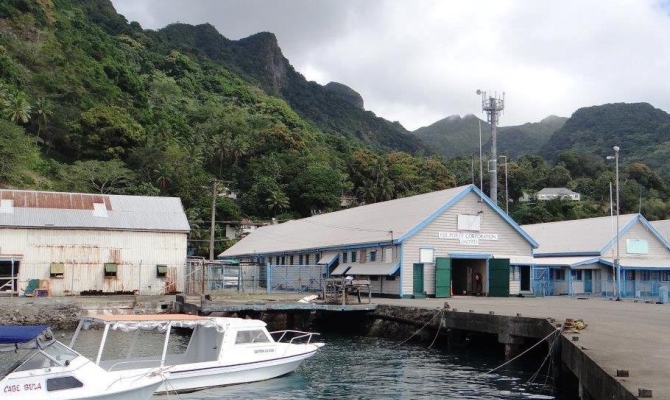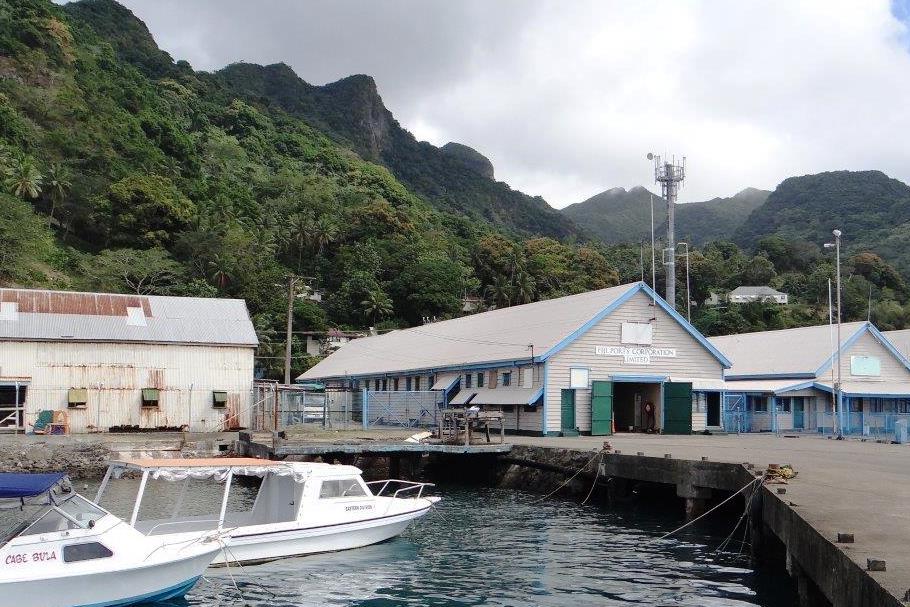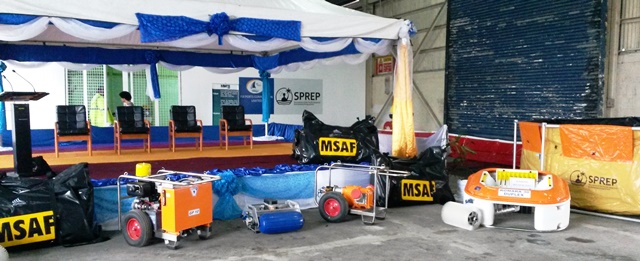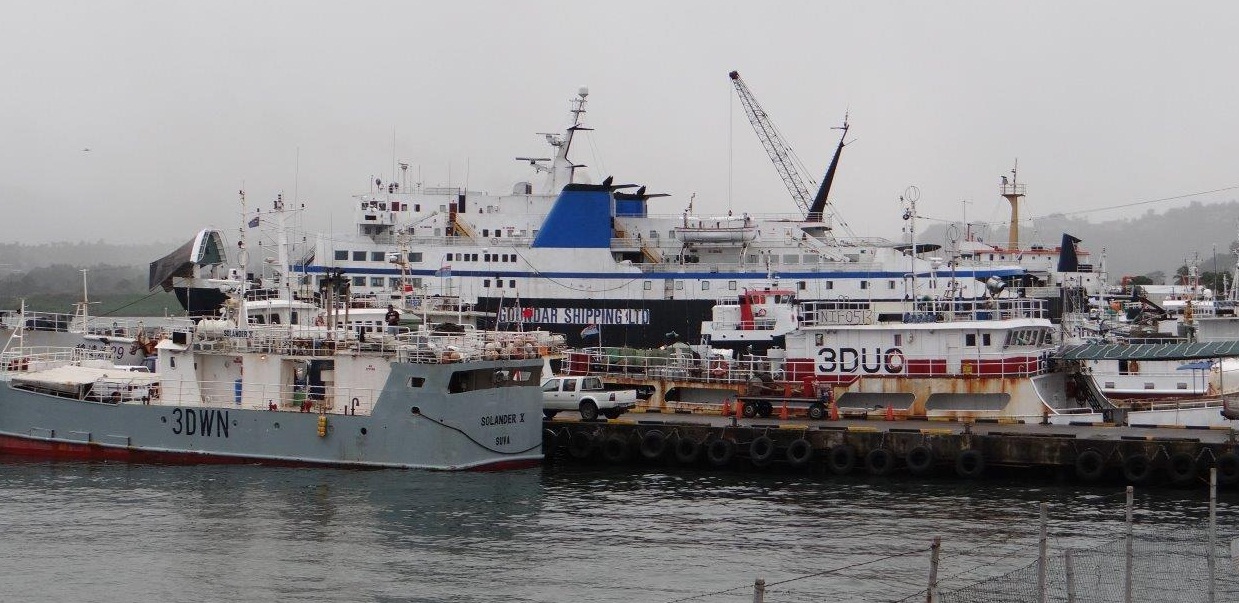
Waste Management and Pollution Control
Protecting people and the marine environment is a priority for Fiji, as four ports of the island nation receives oil spill response equipment and training to the value of NZD 850,000.
At the start of 2015 a team consisting of members from Maritime New Zealand, Secretariat of the Pacific Regional Environment Programme (SPREP), and Department of Environment (DOE and the Maritime Safety Authority of Fiji (MSAF) produced a Report on Oil Spill Environmental Risk Assessment.
The report evaluated the existing prevention and oil spill response systems in Fiji against a risk framework and identified four critical high risk sites for oil spill – Port of Suva, Port of Lautoka, Port of Levuka and Port of Malau. It further provided recommendations for ongoing development of prevention and response measures such as the need for oil spill response equipment and training for staff.
 Port of Levuka, one of the critical high risk sites identified for oil spills. Photo: A.Talouli/SPREP
Port of Levuka, one of the critical high risk sites identified for oil spills. Photo: A.Talouli/SPREP
This has led to funding from New Zealand Foreign Affairs and Trade Aid Programme to purchase the necessary equipment and the training needed for such.
"We are pleased to see that through Fiji's dedication towards quick and efficient responses to oil spills, the much needed support has been given," said Mr. Anthony Talouli, the Pollution Adviser of SPREP.
"It is rewarding to see the assessment report undertaken has led to this assistance given to Fiji, assistance which will ultimately benefit islanders, their communities and environment."
The equipment will help assist with Tier 2 and 3 marine spills. Tier 2 spills are defined as spills that are within the national capability and resources of Fiji to manage and a Tier 3 spill are those that are beyond the national capability and resources of Fiji to manage.
Over the next two weeks a team will travel to each of the four Ports to give hands on training to familiarise staff with the new equipment, review standard operating procedures, develop site safety plan deployment techniques and options such as how to safely and effectively deploy equipment.
The team will also train operators in the development and implementation of a preventative maintenance programme as well as conduct periodic maintenance checks.
"Along with building the capacity of the Marine Safety Authority of Fiji, the training will also help strengthen the skills of other key stakeholders thus improving the national response capability. We're also working to ensure long term maintenance and care of the equipment," said Mr. John Tunidau, the Acting Chief Executive Officer MSAF.
 Oil spill emergency response equipment funded by the Government of New Zealand to be distributed amongst the four different ports of Fiji, accompanied with training on use and long term maintenance.
Oil spill emergency response equipment funded by the Government of New Zealand to be distributed amongst the four different ports of Fiji, accompanied with training on use and long term maintenance.
Photo: A.Talouli/SPREP
The social, economic and environmental resources of Fiji are particularly vulnerable to oil spills.
Mangrove environments dominate the shoreline and may take decades to recover. Fiji is home to many species of marine mammal, sea snakes, turtles and birds and has globally recognised important conservation areas.
This natural environment supports a vibrant Fijian culture along with a very successful tourism industry which generates up to 25% of Fiji's GDP. Fiji also has a large textile and sugar industry and the economic climate indicates shipping is likely to continue to increase bringing with it an increased risk of oil spills.
"It's not only Fiji, spills of oil into the marine environment from ships and land based sources are a major threat to economies and marine environments of the Pacific region," said Talouli.
"You only need to look to the recent events such as the grounding of MV Asian Lily (2012) in Kwaiawata Island, Papua New Guinea, the grounding of Rena (2011) in Tauranga, New Zealand andthe grounding of Forum Samoa II in Apia (2009) to reinforce the importance of marine pollution response preparedness in the Pacific."
Fiji's work in ensuring marine safety contributes to the overall regional actions for protecting people and the marine environment across the Pacific region.
 Maiwalu Jetty, Walu Bay, Suva. Photo: A.Talouli/SPREP
Maiwalu Jetty, Walu Bay, Suva. Photo: A.Talouli/SPREP
In Fiji, marine pollution is regulated by the Maritime Transport Decree (MTD) 2013 which provides the Maritime Safety Authority of Fiji (MSAF) with powers to ensure implementation of a national oil spill response framework such as the National Strategy for Marine Spill Response for Fiji Waters (NATPLAN).
Fiji is also a participating country in the Pacific Islands Regional Marine Spill Contingency Plan (PACPLAN), which provides a framework for regional co-operation and response to major marine spills in the Pacific region.
The PACPLAN sets out priorities for preparedness and identifies responsibilities of member countries to assist in the event of major spills that exceed the response capabilities of one country alone.
The Maritime Transport Decree 2013 sets out an effective framework for the development of oil spill response capability and gives effect to the NATPLAN and Municipal, Provincial Plans.
To develop the NATPLAN further, a Tier II national equipment stockpile should be developed and located in several locations across Fiji. Municipal and Provincial Plans should be developed and include clear criteria for escalation to a national response.
"We now look to the future to see how the work here in Fiji can be replicated across the region to other Pacific island nations, that's the next step."
The handover of the new Oil Spill Response Equipment by the Government of New Zealand to the Government of Fiji took place on 9 August, 2016 in Suva.
At the start of 2015 a team consisting of members from Maritime New Zealand, Secretariat of the Pacific Regional Environment Programme (SPREP), and Department of Environment (DOE and the Maritime Safety Authority of Fiji (MSAF) produced a Report on Oil Spill Environmental Risk Assessment.
The report evaluated the existing prevention and oil spill response systems in Fiji against a risk framework and identified four critical high risk sites for oil spill – Port of Suva, Port of Lautoka, Port of Levuka and Port of Malau. It further provided recommendations for ongoing development of prevention and response measures such as the need for oil spill response equipment and training for staff.
 Port of Levuka, one of the critical high risk sites identified for oil spills. Photo: A.Talouli/SPREP
Port of Levuka, one of the critical high risk sites identified for oil spills. Photo: A.Talouli/SPREPThis has led to funding from New Zealand Foreign Affairs and Trade Aid Programme to purchase the necessary equipment and the training needed for such.
"We are pleased to see that through Fiji's dedication towards quick and efficient responses to oil spills, the much needed support has been given," said Mr. Anthony Talouli, the Pollution Adviser of SPREP.
"It is rewarding to see the assessment report undertaken has led to this assistance given to Fiji, assistance which will ultimately benefit islanders, their communities and environment."
The equipment will help assist with Tier 2 and 3 marine spills. Tier 2 spills are defined as spills that are within the national capability and resources of Fiji to manage and a Tier 3 spill are those that are beyond the national capability and resources of Fiji to manage.
Over the next two weeks a team will travel to each of the four Ports to give hands on training to familiarise staff with the new equipment, review standard operating procedures, develop site safety plan deployment techniques and options such as how to safely and effectively deploy equipment.
The team will also train operators in the development and implementation of a preventative maintenance programme as well as conduct periodic maintenance checks.
"Along with building the capacity of the Marine Safety Authority of Fiji, the training will also help strengthen the skills of other key stakeholders thus improving the national response capability. We're also working to ensure long term maintenance and care of the equipment," said Mr. John Tunidau, the Acting Chief Executive Officer MSAF.
 Oil spill emergency response equipment funded by the Government of New Zealand to be distributed amongst the four different ports of Fiji, accompanied with training on use and long term maintenance.
Oil spill emergency response equipment funded by the Government of New Zealand to be distributed amongst the four different ports of Fiji, accompanied with training on use and long term maintenance. Photo: A.Talouli/SPREP
The social, economic and environmental resources of Fiji are particularly vulnerable to oil spills.
Mangrove environments dominate the shoreline and may take decades to recover. Fiji is home to many species of marine mammal, sea snakes, turtles and birds and has globally recognised important conservation areas.
This natural environment supports a vibrant Fijian culture along with a very successful tourism industry which generates up to 25% of Fiji's GDP. Fiji also has a large textile and sugar industry and the economic climate indicates shipping is likely to continue to increase bringing with it an increased risk of oil spills.
"It's not only Fiji, spills of oil into the marine environment from ships and land based sources are a major threat to economies and marine environments of the Pacific region," said Talouli.
"You only need to look to the recent events such as the grounding of MV Asian Lily (2012) in Kwaiawata Island, Papua New Guinea, the grounding of Rena (2011) in Tauranga, New Zealand andthe grounding of Forum Samoa II in Apia (2009) to reinforce the importance of marine pollution response preparedness in the Pacific."
Fiji's work in ensuring marine safety contributes to the overall regional actions for protecting people and the marine environment across the Pacific region.
 Maiwalu Jetty, Walu Bay, Suva. Photo: A.Talouli/SPREP
Maiwalu Jetty, Walu Bay, Suva. Photo: A.Talouli/SPREPIn Fiji, marine pollution is regulated by the Maritime Transport Decree (MTD) 2013 which provides the Maritime Safety Authority of Fiji (MSAF) with powers to ensure implementation of a national oil spill response framework such as the National Strategy for Marine Spill Response for Fiji Waters (NATPLAN).
Fiji is also a participating country in the Pacific Islands Regional Marine Spill Contingency Plan (PACPLAN), which provides a framework for regional co-operation and response to major marine spills in the Pacific region.
The PACPLAN sets out priorities for preparedness and identifies responsibilities of member countries to assist in the event of major spills that exceed the response capabilities of one country alone.
The Maritime Transport Decree 2013 sets out an effective framework for the development of oil spill response capability and gives effect to the NATPLAN and Municipal, Provincial Plans.
To develop the NATPLAN further, a Tier II national equipment stockpile should be developed and located in several locations across Fiji. Municipal and Provincial Plans should be developed and include clear criteria for escalation to a national response.
"We now look to the future to see how the work here in Fiji can be replicated across the region to other Pacific island nations, that's the next step."
The handover of the new Oil Spill Response Equipment by the Government of New Zealand to the Government of Fiji took place on 9 August, 2016 in Suva.